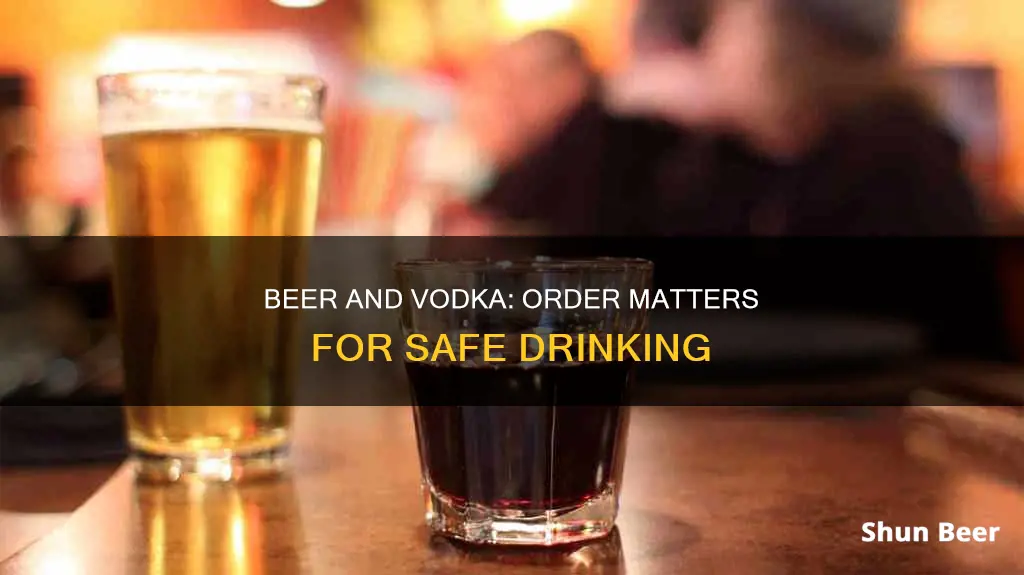
The order in which you consume alcoholic drinks has no impact on whether or not you will experience a hangover. The myth that beer before liquor, never been sicker; liquor before beer, you're in the clear is based on the idea that liquor's high alcohol content is more likely to spike your blood alcohol levels in a short period of time. However, modern research has disproven this theory. A 2019 study found that neither the type nor order of consumed alcoholic beverages significantly affected hangover intensity. Instead, the amount of alcohol you consume and other factors like whether you ate, how frequently you drink, genetics, congeners, and smoking, influence your risk of experiencing a hangover.
| Characteristics | Values |
|---|---|
| Should I drink beer after or before vodka? | It doesn't matter whether you drink beer before or after vodka. What matters is the total amount of alcohol consumed. |
| Beer before liquor, never been sicker | This is a myth. The order of consumption does not influence a person's hangover. |
| Liquor before beer | This is also a myth. Drinking liquor before beer does not protect against a hangover. |
| Amount of alcohol | The amount of alcohol consumed has a more significant effect than the type of alcohol consumed. |
| Carbonated drinks | Carbonated drinks like beer can irritate the stomach lining and increase alcohol absorption. |
| Congeners | Dark spirits may contain higher levels of congeners, which can worsen hangover symptoms. |
| Smoking | Hangovers may be more frequent in people who smoke. |
| Genetics | Genetics can influence how the body metabolizes alcohol and impact hangover severity. |
| Pacing | Pacing is key to avoiding hangovers. Drinking too much, too quickly can lead to a hangover. |
What You'll Learn
- Amount of alcohol consumed is the key factor in hangover severity
- Carbonated drinks irritate the stomach lining, increasing alcohol absorption
- Alcohol type does not influence hangover severity
- Drinking order does not affect hangover severity
- Other factors like genetics, congeners, and smoking influence hangovers

Amount of alcohol consumed is the key factor in hangover severity
The order in which alcoholic drinks are consumed does not influence the severity of a hangover. The common saying, "beer before liquor, never been sicker; liquor before beer, you're in the clear", is a myth. The only way to avoid a hangover is to not drink at all or to keep alcohol intake to a minimum.
The amount of alcohol consumed is the key factor in determining the severity of a hangover. The more alcohol a person drinks, the worse the hangover will be. This is true regardless of the type of drink or how it is mixed. Drinking too much alcohol, whether it is wine, beer, or liquor, will make a person sick. Pacing is, therefore, key.
Hangover symptoms include fatigue, weakness, thirst, headache, muscle aches, nausea, stomach pain, vertigo, sensitivity to light and sound, anxiety, irritability, sweating, and increased blood pressure. These symptoms can vary from person to person and can last 24 hours or longer.
In addition to the amount of alcohol consumed, other factors that can contribute to hangover symptoms include acetaldehyde, a toxic alcohol byproduct; disrupted sleep patterns; withdrawal from alcohol or other substances; and combining alcohol with other substances.
To prevent a hangover, it is recommended to stay hydrated, drink in moderation, make informed drink choices, and prioritize sleep.
Exploring Male Beer Consumption Limits
You may want to see also

Carbonated drinks irritate the stomach lining, increasing alcohol absorption
The order in which you consume beer and vodka does not affect the severity of a hangover. Research suggests that the amount of alcohol consumed and the time taken to drink it are more significant factors. However, carbonated drinks, including beer, can irritate the stomach lining and increase alcohol absorption, which may indirectly influence the intensity of a hangover.
Carbonated drinks introduce air into the stomach, similar to eating or drinking too fast. This can cause stomach pain, bloating, and fullness. The trapped carbon dioxide increases gastric volume, leading to feelings of nausea and bloating. Additionally, the pain receptors in the body may detect carbonation as pain.
Carbonated drinks can also contain additives like sugar, caffeine, and artificial sweeteners, which can irritate the stomach and have negative health effects. For example, caffeine can mask the sedative effects of alcohol, tricking people into thinking they have more energy and leading them to drink more than intended. Artificial sweeteners can also cause a laxative effect, pulling water into the colon and mobilizing stool, which can result in diarrhea.
Furthermore, carbonated drinks can aggravate digestive conditions such as irritable bowel syndrome (IBS) and gastroesophageal reflux disease (GERD). The carbonation and acidity may worsen symptoms for some individuals.
While the carbonation in beer may not be the primary cause of a hangover, it can irritate the stomach lining and increase alcohol absorption. This irritation and faster absorption can indirectly contribute to a more intense hangover, especially when consumed with other carbonated or irritant beverages. Therefore, it is essential to be mindful of the potential effects of carbonation when mixing drinks and to drink in moderation to reduce the risk of hangover symptoms and other adverse health consequences.
Boxers and Beer: Is It a Knockout Combination?
You may want to see also

Alcohol type does not influence hangover severity
The order in which alcoholic drinks are consumed does not influence the severity of a hangover. The common saying, "beer before liquor, never sicker", is a myth. Research has disproven this theory, finding that the amount of alcohol consumed has a more significant effect on hangovers than the type of alcohol.
A 2019 study examined the effects of drinking beer and wine in various orders and combinations on 90 adult participants. The results suggested that drinking order and alcohol type did not influence hangover severity.
The only way to completely prevent a hangover is to abstain from drinking alcohol or to drink in moderation. Responsible drinking and moderation are key to reducing hangover severity, regardless of the beverage.
To reduce the risk of a hangover, it is recommended to stay hydrated by alternating between alcoholic drinks and water, drinking in moderation, making informed drink choices by opting for drinks with lower alcohol content, and prioritizing sleep.
While the type of alcohol does not influence hangover severity, certain compounds in alcoholic beverages may affect the severity of hangover symptoms. Dark spirits, such as bourbon, tend to have higher levels of congeners, which are compounds produced during fermentation that contribute to the taste and smell of the drink. Higher levels of congeners may worsen hangover symptoms for some individuals.
Beer and Worker Stamina: Is There a Link?
You may want to see also

Drinking order does not affect hangover severity
There is a popular saying that goes, "beer before liquor, never been sicker; liquor before beer, you're in the clear." This saying suggests that drinking beer before liquor can cause more severe hangover symptoms. However, modern research has disproven this myth. A 2019 study examined the effect of drinking beer and wine in different orders and combinations on 90 adult participants and found that drinking order did not influence hangover severity.
The amount of alcohol consumed has a more significant effect on hangover severity than the type or order of drinks. High blood alcohol levels are more likely to induce a hangover than low blood alcohol levels. Therefore, to reduce the risk or severity of a hangover, it is important to drink in moderation and control alcohol consumption.
Other factors that can contribute to hangover symptoms include disrupted sleep patterns, withdrawal from alcohol or other substances, and combining alcohol with other substances. Additionally, certain compounds in alcoholic beverages, such as congeners and sulfites, may worsen hangover symptoms. Congeners are found in higher levels in dark spirits and are created during the fermentation process. Sulfites are preservatives found in wine that can cause headaches in people sensitive to them.
While drinking order does not affect hangover severity, there may be benefits to starting with liquor and transitioning to beer. As inhibition decreases with alcohol consumption, starting with a beverage with a higher alcohol content may lead to drinking more. Therefore, sticking with lower-calorie and lower-alcohol options, such as beer, can help monitor the amount of alcohol consumed. Additionally, beer tends to be lower in sugar than spirits, which can leave you feeling better the morning after a night out.
A Beer Before Parting: A Heartfelt Toast
You may want to see also

Other factors like genetics, congeners, and smoking influence hangovers
Several factors, including genetics, congeners, and smoking, can influence the likelihood and severity of hangovers.
Genetics
Research suggests that genetics plays a significant role in hangover susceptibility. A study of twins in Australia found that genetic factors accounted for 45% of the difference in hangover frequency in women and 40% in men. This indicates that genetics is responsible for a large portion of the variation in hangover occurrence, even when individuals consume the same amount of alcohol. Additionally, the study found that people with specific gene variants associated with increased hangover risk also tended to drink to the point of intoxication more frequently. These findings could have implications for understanding alcohol addiction.
Congeners
Congeners are compounds found in alcoholic drinks, produced during the distillation or fermentation process. While ethyl alcohol (ethanol) is the central component of alcoholic beverages, congeners are also present and are believed to contribute to hangovers. Drinks with higher congener levels, such as dark-colored alcohols, tend to result in more intense and prolonged hangovers. Examples of drinks high in congeners include tequila, cognac, and whiskey, while clear alcoholic drinks like white wine, light rum, and gin have lower congener levels. Congeners can affect the taste and aroma of drinks, with specific congeners like acetaldehyde and isobutylene alcohol contributing to the fruity smell of rum and bourbon and a sweet smell, respectively.
Smoking
Smoking tobacco has been found to increase the likelihood and severity of hangovers, particularly when consuming large amounts of alcohol. A study on university students found that smoking significantly increased the odds of experiencing a hangover and intensified hangover symptoms, even when controlling for the number of drinks consumed and other factors. The acute pharmacological effects of nicotine and other smoke constituents are believed to play a role in enhancing hangover sensitivity and severity.
Beer Drinking: Benefits and Limits for Better Health
You may want to see also
Frequently asked questions
It doesn't matter whether you drink beer before or after vodka. What matters is how much you drink and how quickly you drink it.
No, the order in which you drink beer and vodka does not affect how drunk you get. The amount of alcohol you consume and the rate at which you consume it are what affect how drunk you get.
No, drinking beer after vodka does not make hangovers worse. The severity of a hangover depends on the amount of alcohol consumed, not the type or order of drinks.
This saying is based on the idea that liquor has a higher alcohol content and will spike your blood alcohol levels more quickly than beer. However, this saying is not supported by scientific evidence.
To prevent a hangover, it is important to drink in moderation, stay hydrated, and get enough sleep. Alternating alcoholic beverages with water and avoiding drinking on an empty stomach can also help.







